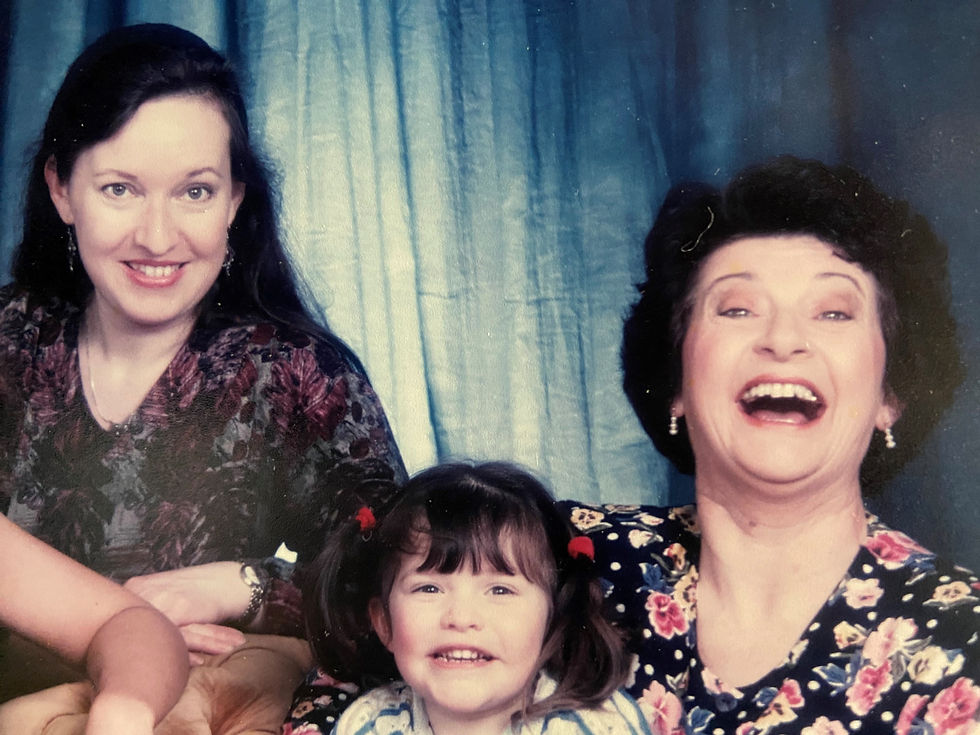How Do You Stand Out from the Crowd?
- Jen Haken
- Sep 4, 2024
- 3 min read

It’s not easy as a small business owner. Especially with so many other similar businesses to yours. So, how do you stand out from the crowd?
Of course, most of us small business owners know many of the marketing techniques to use. But even then, it can take time. That’s where perseverance and patience are needed. And you need to know what works best for your business – you can’t do everything. Or perhaps you can?!
I pondered all this on a morning walk the other day
After my walk, I had a quick shower, got dressed, and slapped some moisturiser on my face. Not forgetting that essential eye contour cream, of course. As I gently dabbed the cream around my eyes, I saw my mother staring back at me. She appears in my mirror far too often these days. It’s disconcerting. Particularly as I don’t really look like her at first glance.
Mum died almost six years ago of Alzheimer’s and Vascular Dementia. In her younger days, she had short black hair and brown eyes; my hair is naturally mid-brown and my eyes are hazel. I inherited Mum’s legs and wide hips, noticeable from an early age. But in more recent years, I’ve realised that I’ve also inherited her eye shape, mouth and hands. I’m pleased about the hands – Mum’s were elegant.
Talking to one of my sisters recently, I mentioned this maternal likeness that startles me whenever I look in the mirror. Becky vehemently disagreed!

“No way,” she said. “Lynda looks like Mum. You don't!”
Lynda does look amazingly like our mother … from a distance. She has the same hair colour and head shape. But close up, her features are very different. From a distance, I look nothing like my mother. Look closely, though, and my features are very similar.
I was astonished that Becky couldn’t see that! I must find a photo to prove it next time we’re together.
Differentiating your similarities
But what does this familial likeness have to do with marketing and copywriting?
It’s about presenting ourselves differently from our similar competitors and finding our unique features. We may offer comparable services, but we need to differentiate ourselves to attract our ideal customers. We must pinpoint what makes us different and shout about those differences.
What makes your service or products stand out from the crowd?
With many copywriters available (some who I enjoy collaborating with), here's how I’m different:
My ideal clients are in people-centric organisations – lifestyle, health and wellbeing; business coaches and HR consultants. Yes, other copywriters work in these sectors. But have they actually worked in HR and healthcare? I have. Do they have well-being and mental health support experience? I do.
With many years of experience working in marketing agencies as well as freelancing, I’ve written for a wide variety of industries. From automotive to insurance, chartered surveyors and photographers; food, drink and cookery schools … the list goes on. Yes, other copywriters work in these sectors too. But how flexible is their writing style? Can they write about different kinds of insurance one minute, the dangers of Japanese knotweed the next, and later the artistic intricacies of photographing champagne being poured into a flute? Each one needing very different tones of voice? I can (as should most good copywriters).
I spend time getting to know my clients and their businesses, learning all I can about their products/services and how they work, helping to ensure I do a good job. Better than good. Sometimes, I even turn people down if I feel we're not a good fit. Or where I may feel out of my depth – anything too technical or science-y, for instance.
And I refuse to use AI to write copy. I may use AI to generate ideas, and that’s it.
There’s probably far more that differentiates me. But it usually takes others to tell you why you’re different and what makes you unique.
Luckily, I can do that for others. A completely objective outsider can help you define your USP (Unique Selling Proposition), once they get to know you. For example, I know how my coaching clients are completely different to one another, who their differing target audiences are, and how to write to them.
Speaking of your USP, here’s an article that should help you define yours and then write about it, helping to put you head and shoulders above your competitors.
Need help finding your unique differences and writing compelling marketing content?
Set up a discovery call:



Comments